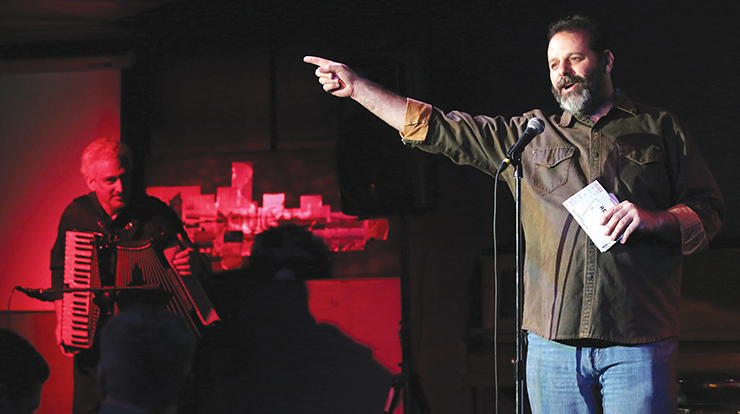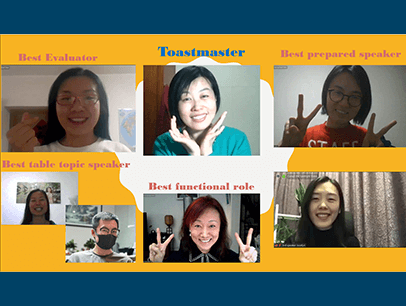 Lily Keezer captures 1st place—and a 50 dollar cash prize—in the November StoryCentral Slam, a monthly online storytelling contest hosted by the article’s author, Caren Neile. Keezer’s winning story was about an eerie experience related to her love for her grandmother.
Lily Keezer captures 1st place—and a 50 dollar cash prize—in the November StoryCentral Slam, a monthly online storytelling contest hosted by the article’s author, Caren Neile. Keezer’s winning story was about an eerie experience related to her love for her grandmother.Picture this: 10 strangers share their brief, heartfelt stories of life and love right in your own living room—and you don’t even have to feed them. That’s what happens in an online storytelling slam.
By the time COVID-19 hit my area, I had been hosting live monthly storytelling slams for 16 years. What is a storytelling slam? It’s an event where participants all present personal stories and compete against each other, often for cash or other awards. The stories are told in a more performative style than you typically would see in a Toastmasters speech. And no notes or visuals are allowed.
In March 2020, my group’s event drew 50 people, a perfect number for the cozy little bar that was our most recent venue. In April, as pandemic restrictions increased, we transferred the monthly 90-minute slams to Zoom.
Emily Harris, a Toastmaster who belongs to two clubs in Pittsburgh, Pennsylvania, has participated in several of the slams.
“When I joined Toastmasters four years ago, I learned that weaving personal stories into a speech created an immediate bond with the audience,” she says. “The slams give me an audience outside my clubs where I can practice, get feedback from different perspectives, and maybe win a cash prize!”
Harris, an Area Director, says one story she told was about looking for a safe place in the early months of the pandemic. Harris recalled when she was 5 years old and hid in a small, cozy space—the forsythia bush in her family’s backyard.
“That was my safe place during another frightening time in my life,” Harris said in her story.
Slam History
Storytelling slams began gaining widespread popularity with the birth of the Moth in 1997. The New York-based nonprofit presents slams and a variety of other storytelling events in the United States and other countries. The organization also hosts the Moth Podcast and the Moth Radio Hour, which features storytelling from around the world. Other prominent storytelling events include the National Storytelling Festival in Jonesborough, Tennessee (started in 1973), and the Scottish International Storytelling Festival in Edinburgh.
Some storytelling slams charge admission and present top-flight performances; others, like mine, are more about building community and letting whoever wants to share their story do so. Most slams feature up to 10 storytellers, who may or may not have registered ahead of time, been coached, or auditioned.
Harris, a member of the Bakery Square and Woman2Woman Toastmasters clubs, views the events as a great supplement to Toastmasters meetings, especially for members who want to beef up their storytelling skills.
“Toastmasters who tell at a slam often have the opportunity to ask for feedback from all the tellers, gaining different perspectives. And because slams often take place in casual settings and the idea is to entertain rather than educate, there is a relaxed atmosphere that encourages experimentation with spoken word, poetry, music, and movement.”
 Caren Neile
Caren NeileOver the years, our slam participants have shared captivating personal stories on topics that span the range of human experience: immigration, accidents, cancer recovery, meeting the love of one’s life, coming out to one’s parents—and plain old silly coincidences, practical jokes, and embarrassing moments. Some of my favorites haven’t expressed anything remotely dramatic or outrageous at all. Sort of like the famed American television show “Seinfeld,” they’ve been about almost nothing at all; however, the performance of the teller, including word choice, energy, body language, and vocal variety, transforms the mundane into an entertaining story.
Harris says it has been exciting to see speakers improve their skills at the slams.
“I’ve seen how the core group of storytellers keeps getting better and better. Every month they have more poise and tell tighter, more structured stories. As an extra benefit, their online presentation skills are also improving.”
Another benefit to holding slams online: People all over can attend. In our virtual events, we have had people from as far away as Vienna, as well as five or six other states in the U.S., where I am located. One person even told a story from a moving car! (Fortunately, she wasn’t at the wheel.)
The Toastmasters Benefit
Nearly every storytelling slam I’ve ever held has included at least one Toastmaster or former member onstage or in the audience. Toastmasters know that they can glean all kinds of benefits from these events. Here are a few:
- Having a fellow Toastmaster evaluate your presentation. (Check first with your club’s Vice President Education to make sure the event meets the proper criteria for speaking at outside events.)
- Practicing storytelling. “Stories are the best way to express emotion and connect with your audience,” says Harris. “Online slams are a wonderful way to get members comfortable with the form, whether they are telling or listening.”
- Promoting your club. All you have to do is tell a story about something wonderful that happened in a Toastmasters meeting to get people intrigued, as long as it doesn’t sound like a commercial. Try something like: “It was a Wednesday evening, 7:45 p.m., and there I was at Village Green Middle School, as I am every Wednesday at that time.” Voila! You’ve just given time, day of the week, and location, and you are still telling a story.
- Taking the chance to rehearse. Even if you’re not being evaluated at the slam, you can still try out a story you’re planning to tell at your next meeting. Or maybe you’re not planning to tell a story at the club, but simply want more speaking practice? You’ve got it!
- Learning to speak on camera. “Like club meetings, slams teach Toastmasters to think about the backgrounds people see and effective lighting for more personal, non-PowerPoint presentations,” says Susan Schulz, Vice President Public Relations for the Boca Raton Toastmasters in Florida. “We learn where to stand in front of the camera and how much to move around. We also learn about the right clothing, makeup, and hair.”
In person or online, slams are a powerful way to celebrate personal storytelling. What can be better than that?
Editor’s Note: Learn more about the art of storytelling in the Pathways project “Connect with Storytelling,” an elective available in all paths.
Caren S. Neile, PhD teaches, writes, and stockpiles social capital in Boca Raton, Florida. Visit her at carenneile.com
Related Articles

Presentation Skills
Story Takes a Turn

Presentation Skills
Everyone Has a Story

Online Meetings



 Previous
Previous
 Starting Your Own Online Slam
Starting Your Own Online Slam
 Previous Article
Previous Article